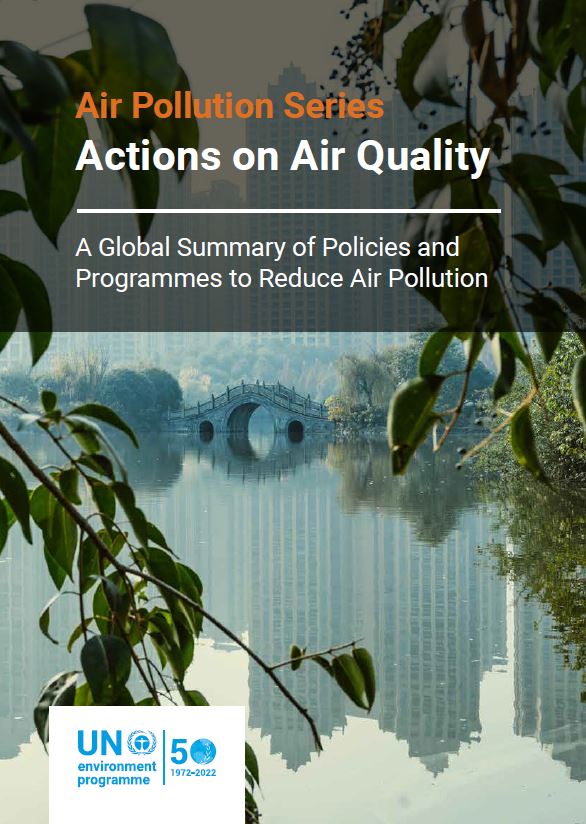UNEP Publications Pre-2023: Recent submissions
Now showing items 121-140 of 1251
-
Acknowledgements - GEO for Business Brief No. 3: The Role of Business in Transforming Food Systems
(2021)Acknowledgements document. -
Annex 1 – Transformation Efforts in the Food Industry - GEO for Business Brief No.3: The Role of Business in Transforming Food Systems
(2021)This annex provides examples of the types of transformation sprints that companies are engaged in across the food system. -
The Role of Business in Transforming Food Systems
(2021)Food plays a crucial role in all our lives, not only in supporting our physical and mental health, but also the health of our environment, cultures and economies. While our food systems have evolved in an attempt to provide ... -
Global Chemicals and Waste Indicator Review Document
(2021)The Global Chemicals and Waste Indicator Review Document aims to strengthen the knowledge base of chemicals and hazardous waste and enhance the capacity of selected countries to track progress towards related SDG indicators ... -
Guidelines for Integrating Ecosystem-based Adaptation into National Adaptation Plans: Supplement to the UNFCCC NAP Technical Guidelines
(2021)The Guidelines aim to guide adaptation practitioners at national and local levels on how to take different steps when factoring ecosystems functions and services into countries’ NAP processes and instruments. The Guidelines ... -
Actions on Air Quality: A Global Summary of Policies and Programmes to Reduce Air Pollution
(2021)This global report provides a review of policy actions of Member States per the mandate provided by UNEA Resolution 3/8 on Preventing and reducing air pollution to improve air quality globally. It builds on the United ... -
Progress on Freshwater Ecosystems: Tracking SDG 6 Series – Global Indicator 6.6.1 Updates and Acceleration Needs
(2021)In 2017, with the ambitions of the 2030 Agenda for Sustainable Development firmly under way, the United Nations Environment Programme (UNEP) reached out to Member States to request – for the first time – national data on ... -
Progress on Integrated Water Resources Management: Tracking SDG 6 series - Global Indicator 6.5.1 Updates and Acceleration Needs
(2021)This report, produced as part of the UN-Water-led Integrated Monitoring Initiative for SDG 6, emphasizes the scale of the challenge and identifies where and how progress can be accelerated. UNEP is committed to supporting ... -
Progress on Ambient Water Quality: Tracking SDG 6 Series - Global Indicator 6.3.2 Updates and Acceleration Needs
(2021)Through the UN-Water Integrated Monitoring Initiative for SDG 6 (IMI-SDG6), the United Nations seeks to support countries in monitoring water- and sanitation-related issues within the framework of the 2030 Agenda for ... -
Regulating Air Quality: The First Global Assessment of Air Pollution Legislation
(2021)This global study assesses national air quality legislation in 194 States and the European Union (EU) against a model of robust air quality governance developed as part of the research. The model is based on the diversity ... -
Is the COVID-19 Economic Recovery Building a Sustainable Future?: A Snapshot from Latin America and the Caribbean
(2021)The region of Latin America and the Caribbean (LAC) has faced some of the worst health and economic consequences of the COVID-19 crisis. Amid economic and social disruption, inequality in the world’s most unequal continent ... -
Chapter 6. The Latest Frontier: Exotic Consumerism: Illegal Trade in Live Animals - UNEP Frontiers 2016 Report: Emerging Issues of Environmental Concern
(2016)Great apes and other live animals comprise a highly pro$table and symbolic aspect of the US$23 billion illegal wildlife trade--the fourth most lucrative black market after drugs, people and arms smuggling – and the live ... -
Chapter 5. Poisoned Chalice: Toxin Accumulation in Crops in the Era of Climate Change - UNEP Frontiers 2016 Report: Emerging Issues of Environmental Concern
(2016)Extreme climatic conditions reduce yields and increase postharvest losses. They also trigger biophysical reactions in plants in response to environmental stresses. These reactions include concentrating chemical compounds ... -
Chapter 4. Loss and Damage: Unavoidable Impacts of Climate Change on Ecosystems - UNEP Frontiers 2016 Report: Emerging Issues of Environmental Concern
(2016)Anthropogenic climate change is underway and will continue for the foreseeable future. It is manifesting more rapidly and more intensely than many expected.1,2 The most recent global assessment by the Intergovernmental ... -
Chapter 3. Microplastics: Trouble in the Food Chain - UNEP Frontiers 2016 Report: Emerging Issues of Environmental Concern
(2016)As the world’s demand for plastic materials continues to grow, management of plastic waste will remain a global challenge. In 2014, global plastic production exceeded 311 million metric tons, a 4.0 per cent increase over ... -
Chapter 2. Zoonoses: Blurred Lines of Emergent Disease and Ecosystem Health - UNEP Frontiers 2016 Report: Emerging Issues of Environmental Concern
(2016)The 20th century was a period of unprecedented ecological change, with dramatic reductions in natural ecosystems and biodiversity and equally dramatic increases in people and domestic animals. Never before have so many ... -
Chapter 1. The Financial Sector: A Linchpin to Advance Sustainable Development - UNEP Frontiers 2016 Report: Emerging Issues of Environmental Concern
(2016)The UNEP Frontiers 2016 edition presents six emerging issues. It highlights, for example, that the global significance of the financial sector should not confine itself only to enhancing global economic growth, but also ... -
The State of Food Waste in West Asia
(2021)The State of Food Waste in West Asia report was commissioned by the United Nations Environment Programme West Asia Office. It is timely coming after the publication of the Food Waste Index 2021 report (UNEP 2021) and dives ... -
Policy Options to Eliminate Additional Marine Plastic Litter By 2050 Under the G20 Osaka Blue Ocean Vision: An International Resource Panel Think Piece
(2021)The Osaka Blue Ocean Vision, agreed under the Japanese G20 presidency in 2019, voluntarily commits G20 countries to “reduce additional pollution by marine plastic litter to zero by 2050 through a comprehensive life-cycle ...





















